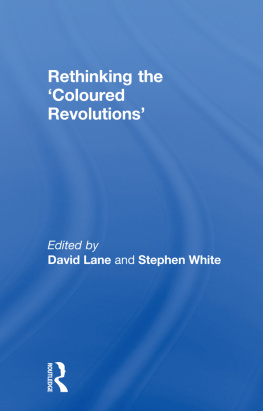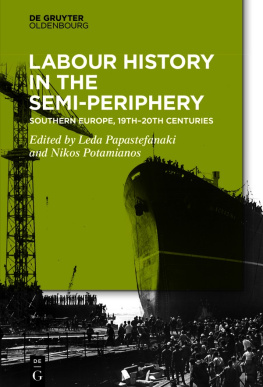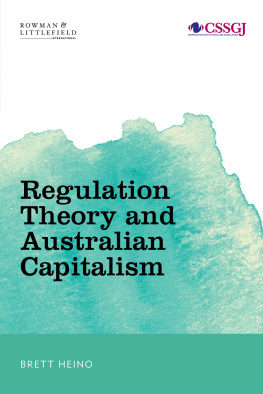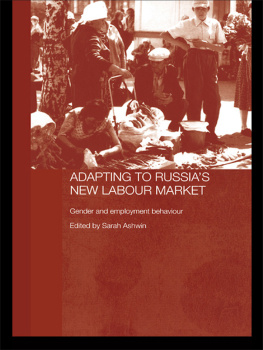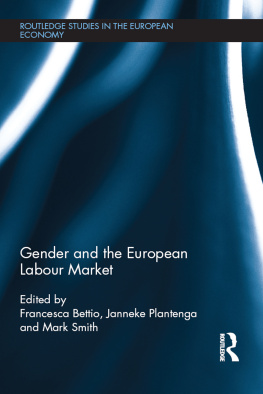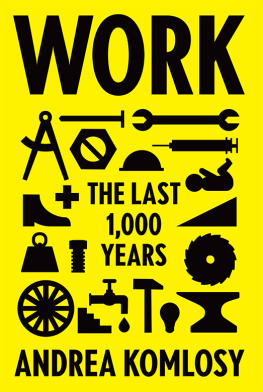Soviet Labour and the Ethic of Communism
By the same author
The End of Social Inequality? Class, Status and Power under State Socialism (1982)
State and Politics in the USSR (1985)
Soviet Economy and Society (1985)
Labour and Employment in the USSR (Wheatsheaf Books, 1986)
Soviet Labour and the Ethic of Communism
Full Employment and the Labour Process in the USSR
David Lane
Professor of Sociology
University of Birmingham
First published 1987 by Westview Press
Published 2019 by Routledge
52 Vanderbilt Avenue, New York, NY 10017
2 Park Square, Milton Park, Abingdon, Oxon OX14 4RN
Routledge is an imprint of the Taylor & Francis Group, an informa business
David Lane, 1987
All rights reserved. No part of this book may be reprinted or reproduced or utilised in any form or by any electronic, mechanical, or other means, now known or hereafter invented, including photocopying and recording, or in any information storage or retrieval system, without permission in writing from the publishers.
Notice:
Product or corporate names may be trademarks or registered trademarks, and are used only for identification and explanation without intent to infringe.
Typeset in 11pt Times by Woodfield Graphics, Fontwell, Arundel, West Sussex
ISBN 13: 978-0-367-28823-5 (hbk)
This work has been facilitated by the support of the British Economic and Social Research Committee (Grant F230085) which provided the author with one term's study leave and one year's research assistance, mainly in the form of Sheila Marnie who gave excellent help. My thanks also to Linda McLeod who also assisted with the research for a short period and to Mike Berry who saved me from making many mistakes. I would also like to acknowledge the support of the Kennan Institute, Washington D.C. for a month's visiting Fellowship and to the University of Illinois at Urbana Champaign for the facilities of their summer research lab. The Alexander Baykov Library at Birmingham University, the Library of Congress and the Radio Liberty Archives were invaluable sources of literature.
On 13 March 1930, Michail Shkunov, A Moscow plumber, finally got a job. When he left the labour exchange, the doors closed and Soviet commentators pronounced that this event symbolized the end of mass unemployment in the USSR. Since that time, the provision of regular paid labour and a permanent occupation for all who are able to work has been one yardstick which has been used to legiti mate Soviet society as a socialist state. This book seeks to discover the extent to which this claim is true and whether there are any systemic fe atures of Soviet society in distinction from capitalism which lead to the provision of full employment.
Almost all research in the West on employment (or unemployment) and the labour process is based on capitalist market-type societies. Levels of unemployment are seen to derive from the working of the market economy: to be the result of structural insufficiencies in demand, of the overpricing or immobility of labour oras seen by Marxist criticsto be consequent on the laws of capitalist accumulation creating a reserve army of idle people. Employment and the labour process in socialist states must be seen in a completely diffe rent economic, ideological and political context. It will be established in this book that the Soviet economy is one of full employment with the highest rate of paid employment known to history. This is considered to be a consequence of the operation of the economic mechanism and political system. In distinction from market economies, it will be shown that in the socialist economy there is no effective propensity to increase the profitability of capital by reducing labour costs.
The contemporary 'labour process' approach emphasizes the role of labour as the creator of wealth in the context of the Exploitation of workers by capital prevents work from being the expression of a human need; coercion of labour by management is ensured by depriving workers of controlscientific management' and automation lead to deskilling, to dependency on management, to redundancies and a pool of surplus labour which enfeebles the political resistance of workers.
This kind of approach cannot be applied without considerable modification to socialist states. It is not appropriate here to explain the Soviet economic system but some of the major distinctions from market capitalism may be noted. The competition of capitals is replaced by administr ative direction of accumulati on; wholesale and consumer prices are fixed by planning organs. Output and product mix is not determined by market conditions and demand but by an administr atively assigned economic plan. From the point of view of the enterprise, the output plan is the main indicator of success. There is a quasi-labour market in which the price of labour may respond to shortages within fairly strict wage diffe rentials laid down by the planners and the total wage fund is given to a production enterprise. There is little incentive to reduce labour costs or the number of workers employed; on the contrary, the enterprise's interest is served by the inflation of the wage fund. In this context, the quasi-labour market operates at the industry and enterprise level. Full employment and the absence of administr ative restrictions on mobility between jobs give rise to labour mobility between enterprises. To maintain a large and reliable workforce, enterprises seek to reward their employees with better facilities to earn wages and provide payments in kind. This gives rise to the differentiation of conditions and opportunities not as under capitalism on the basis of a monopoly of skill or by bargaining position but by the industry and enterprise in which a person works.
Turning from the economic mechanism to the political and ideological spheres, there are also major dissimilarities between the USSR and the West. The government accepts responsibility for the provision of occupations for the population of working age and for a job thought appropriate for the worker. Marxist-Leninist ideology regards work not only as an instrumentality to provide income to meet needs, but as a human need in itself. A priority of policy and one which confers legitimacy on the leadership is to provide employmentalbeit, if necessary, at the expense of efficiency. Trade unions operate on an industry-wide basis and their prime job is to fulfil the planto increase outputrather than to support some sectional interest. The Communist Party plays an administrative role unknown to political parties in western societies: it functions not only to integrate the worker but also seeks to stimulate the efficiency of management and the productivity of the employee.
It will be shown in the chapters that follow that the Soviet economy is one of full employment and labour shortage. This affects the labour process by strengthening the position of labour vis--vis management, and weakening the 'control' of management. It leads to a 'slack' labour regime, with infractions of labour discipline such as absenteeism and low effort. In order to improve efficiency and labour productivity, the economic planners and management have to devise new and diffe rent methods of labour motivation. These involve collecti ve financial incentive schemes, the use of moral stimulati on, the development of a collect ive consciousness on the part of the workforce, and greater reliance on administrative control. A dilemma facing the Soviet economic and political leadership is whether it can increase efficiency in general and labour productivity in particular within the confines of a full-employment economy.


